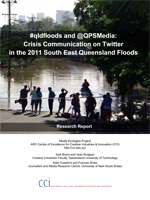Canberra.
And the (dubious) honour of presenting the final paper in the final session at DHA 2012 falls to … me. Below is the Powerpoint, and I’ll try to add audio to this as soon as I can, too I've now finally also managed to add the audio, no thanks to a very dysfunctional Slideshare.

 Twelve months ago Brisbane, and the South East Queensland region, were just about to begin the long process of recovery from the major floods which affected Toowoomba, the Lockyer Valley, Ipswich, and Brisbane itself. One of the more positive stories to emerge from the crisis, though, was how social media were used as a tool for sharing news and information about the disaster, and for assisting locals with organising the (significantly volunteer-driven) relief and recovery effort.
Twelve months ago Brisbane, and the South East Queensland region, were just about to begin the long process of recovery from the major floods which affected Toowoomba, the Lockyer Valley, Ipswich, and Brisbane itself. One of the more positive stories to emerge from the crisis, though, was how social media were used as a tool for sharing news and information about the disaster, and for assisting locals with organising the (significantly volunteer-driven) relief and recovery effort.











